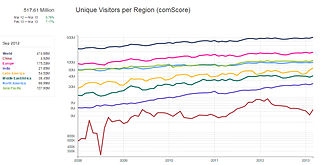
The below was originally published by Sue Gardner, Executive Director of the Wikimedia Foundation, on the Foundation’s blog. You can see the original here.
In the Wikimedia movement, we have a vision statement that inspires many contributions to our endeavour: “Imagine a world in which every single human being can freely share in the sum of all knowledge. That’s our commitment.”
We’re still a long way from realizing that vision, but we’ve recently surpassed an important milestone: as of March 2013, the combined sites hosted by the Wikimedia Foundation reached more than 500 million monthly unique visitors, according to the latest comScore Media Metrix data. Our traffic increased to 517 million in March, five percent higher than our previous record: 492 million in May 2012.
While more people are coming to Wikipedia and the other Wikimedia sites, they are also staying longer and reading more. Over the past 12 months, Wikipedia monthly page requests increased from 17.1 billion to 21.3 billion, with the mobile share increasing to roughly 15 percent of the total, or more than 3 billion monthly views (data). We’re also gratified to see growth in significant target areas: in India, traffic as a percentage of our worldwide total increased from 4.0 percent to 4.8 percent; in Brazil it increased from 3.6 percent to 5.9 percent.
To reach the entire planet, we will need to not only continue to expand our mobile offerings, but also eliminate barriers to access. With Wikipedia Zero, we’re partnering with mobile providers in the developing world to reduce or eliminate data fees for accessing Wikipedia on a mobile phone. In March, we announced the fifth major Wikipedia Zero partnership, which means that the program will be available to 410 million mobile users around the world.
For those who don’t have an Internet connection at all, Wikimedia movement contributors are enabling offline access to Wikipedia, such as the work by Kenyan volunteers who travel to rural schools and install copies of the encyclopaedia on computers there. And now, there’s also an open source application for Android phones and tablets that makes it easy to download and read offline copies of Wikimedia content.
The idea of enabling every single human being to freely share in the sum of all knowledge is still as audacious as ever — but it’s also starting to look like an achievable goal, if we come together to make it happen.
Sue Gardner, Executive Director, Wikimedia Foundation
Copyright notes: “Wikimedia Reportcard” by the Wikimedia Foundation. To the extent possible under law, The Wikimedia Foundation has waived all copyright and related or neighboring rights to the Monthly Report Card data and charts.





